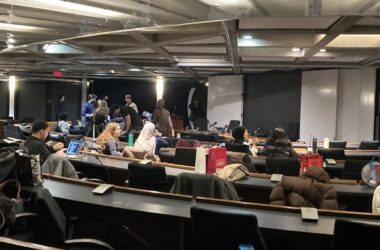Montreal is a unique and vibrant city filled with countless activities, events, and festivals occurring all year round. The city also contains an abundance of aesthetically pleasing cafés and restaurants, with exciting ambiances and delicious food. It is tempting, when surrounded by energetic city life, to go out and take advantage of the fun every weekend. However, the city’s charms come at the cost of both money and time, making budgeting difficult.
In particular, students who are transitioning from campus residence to an apartment face significant lifestyle adjustments. Acknowledging the challenges of this transition, we gathered student insights on making the switch, as well as how they budget their money and manage time while handling academic responsibilities.
Nicholas Coffin, U2 Arts, shared how his busy class schedule limits his ability to grocery shop, cook, and clean up. As a result, he says that he often opts for takeout, “less so for the food itself but more so for the convenience of it because I generally don’t have a lot of time to do much of anything due to how busy I am.”
Meal prepping offers another option, saving both time and money. Though it requires some effort upfront, preparing meals for the week can ultimately save a lot of time. Focusing your cooking time into one afternoon minimizes the number of trips you need to make to the grocery store. Furthermore, the planning involved in meal prep allows you to buy food in bulk, which is more cost-effective than purchasing smaller quantities.
While cooking at home may be more budget-friendly, it cuts into valuable study hours. By being aware of your workload and keeping up with all your assignments you can not only save time but also easily prepare ahead of time for the expenses you are going to make.
Similarly, constraints due to students’ academic workload often lead them to spend money on convenience services or quick meals, allowing them to focus on their studies without losing precious time. Ultimately, while choosing between time and money may offer temporary relief, learning how to balance both effectively is a vital life skill that will serve students well beyond their academic years.
Francesca Fogelberg, U3 Arts, stated that she was “working a bit part-time while doing school” and that she “worked during the summer to make sure that [she] can afford to do some fun stuff.” Likewise, Madison Bass, U1 Science, explained how limiting her day-to-day expenses to essential things such as grocery shopping allowed her to save money for other activities such as going out.
For students facing similar challenges, one approach to stretching their budget for social activities is taking advantage of affordable options on campus. For instance, the General Store in the Engineering Building offers one-dollar coffee and cheap sandwiches. For Bass, taking advantage of her oneCard money has been an important strategy in her budget management. Your oneCard money is a valuable way to save money on campus since many places such as Mezze and the Soupe Cafe offer meals that you can buy with it. You can also use your OneCard to purchase school manuals at Le James, making it a versatile tool for managing both your meal budget and academic expenses—offering a convenient way to save while navigating student life!
One effective way to improve money management is by using a banking app, which offers detailed data and insights into spending habits. By tracking patterns and identifying peak spending periods, students can develop better strategies to manage and control our expenses. However, it can also be easier and clearer to use Google Sheets to track and monitor your spending habits. Another way to be more aware of expenses is to separate your savings and chequing accounts. By weekly transferring your money from your savings into your chequing account, you can control the money you spend and make sure you stick to your budget. Don’t forget to reward yourself from time to time though!







